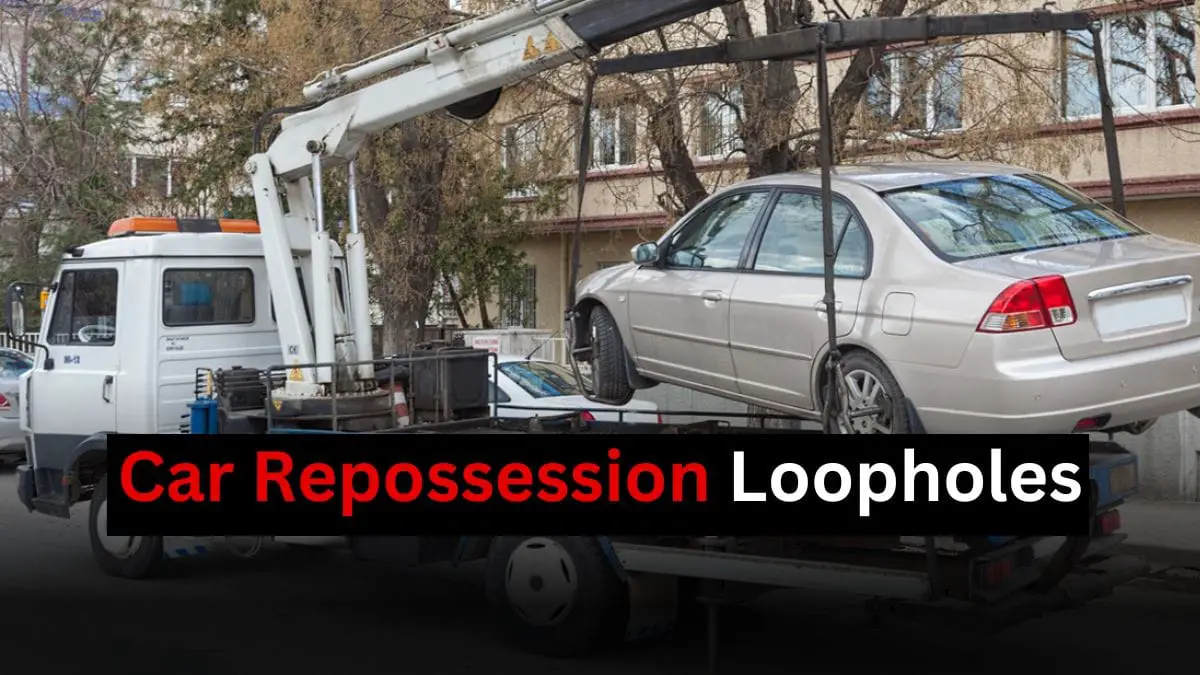Car repossession can be a scary process, but you do have options. If you’re behind on payments or worried about losing your car, knowing the right steps can make a huge difference. This guide will break down everything in simple terms to help you understand your rights and figure out the best way to avoid or delay repossession.
Car Repossession Loopholes
What Is Car Repossession?
Car repossession happens when a lender takes your car back because you’ve fallen behind on loan payments. Since the car acts as a form of security for the lender, they’re legally allowed to take it back if you default on payments. But there are rules in place to protect you, and understanding them can open up options to fight or delay the repossession.
1. Know Your Basic Rights
Every state has different rules on repossession, so it’s important to know your rights. Here are a few basic protections you might have:
- No Disturbance Allowed: Repossession agents can’t use violence or cause a big scene when taking your car. If they do, that’s against the law.
- Right to Pay and Reinstate: Some states let you pay the amount you’re behind on (plus fees) to get your car back and keep the loan going.
- Redemption Period: In many cases, you can pay off the remaining balance on the loan before the car is sold, which allows you to reclaim it.
Knowing these rights can help you spot illegal actions and take steps to protect yourself.

2. Look Closely at Your Loan Agreement
Your car loan agreement is like a contract, and sometimes it includes clauses that work in your favor. Take a look at:
- Grace Periods: Some loans give you a grace period for late payments before repossession starts.
- Option to “Cure” the Default: In some agreements, you may only need to pay the overdue amount to get back on track, rather than the entire balance.
- Repossession Terms and Fees: The contract might limit how much the lender can charge you or set certain conditions for repossession.
Reviewing the fine print may reveal ways to delay or avoid repossession.
You Might Like This: The Ultimate Guide to Managing Your, Gomyfinance Bills
3. Talk to Your Lender
One of the simplest ways to avoid repossession is by reaching out to your lender directly. Many lenders prefer to work out a deal instead of going through the expensive repossession process. Here’s what to ask about:
- Loan Modifications: You might be able to change the loan terms, like lowering payments or extending the loan length.
- Temporary Payment Pause (Forbearance): Some lenders let you pause payments for a short time if you’re in financial trouble.
- Catch-Up Payment Plan: Propose a plan to pay off your missed payments in installments, making it easier to keep up.
Open communication can often lead to a solution that avoids repossession.
4. Consider Filing for Bankruptcy
If you’re struggling with multiple debts, filing for bankruptcy might be a way to hold off repossession temporarily:
- Automatic Hold (Stay): Bankruptcy stops all debt collection activities for a while, which can give you some breathing room.
- Debt Reorganization: Chapter 13 bankruptcy lets you reorganize debt, including car payments, so you can keep the car and pay over time.
- Reducing Loan Balance (Cramdown): In some cases, you may be able to reduce what you owe on the car to its current market value.
While bankruptcy isn’t for everyone, it can sometimes offer temporary relief from repossession and let you catch up on payments.
5. Voluntary Repossession as a Last Resort
If repossession seems unavoidable, voluntarily giving up the car might be better for your finances than having it forcibly taken. Here’s why:
- Lower Fees: By surrendering the car yourself, you might avoid extra fees for towing and storage.
- Better Control: You can decide when and how to return the car, which gives you time to plan for alternative transportation.
- Slightly Less Credit Impact: Voluntarily returning the car may look slightly better on your credit report than a forced repossession.
Although your credit score will still be affected, voluntary repossession could minimize costs and provide a more controlled option.

6. Know About Consumer Protection Laws
Beyond repossession rules, federal laws also protect you from shady or overly aggressive actions by lenders and debt collectors. Key laws include:
- Truth in Lending Act (TILA): Requires lenders to provide clear information about your loan terms.
- Fair Debt Collection Practices Act (FDCPA): Protects against harassment or misleading practices by debt collectors.
- Unfair, Deceptive, or Abusive Acts (UDAAP): Prevents lenders from unfair or deceptive practices, including some repossession actions.
If you suspect any unfair practices, you can file a complaint with the Consumer Financial Protection Bureau (CFPB) or your state’s attorney general.
7. Strategies to Delay or Avoid Repossession
If you’re close to paying off your car, there are a few creative strategies to consider that might delay repossession:
- Partial Payments: In some cases, even a small payment can restart the clock, giving you more time to gather the full amount.
- Store the Car Securely: If you keep the car in a locked garage, repossession agents might have a tougher time accessing it, although it’s essential to stay within legal limits.
- Request Loan Documentation: If the lender has sold your loan to another company, they must provide paperwork to prove they can legally repossess your car. This process can take time and might delay repossession.
These methods are best used carefully, but they can buy you time to figure out a longer-term solution.
8. Understand the Long-Term Effects of Repossession
Repossession has serious long-term impacts, especially on your credit. A repossession can stay on your credit report for up to seven years, affecting your ability to borrow in the future. Additionally, if the car sells for less than the remaining loan amount, you may still owe the difference (called a “deficiency balance”). Lenders can sometimes even take legal action to collect this balance.
The sooner you address the situation, the less damage repossession will likely do to your finances.
Wrapping Up
Preventing repossession is about understanding your options, keeping open communication with your lender, and acting quickly. From knowing your state’s laws to using federal consumer protections, there are plenty of ways to keep your car and manage your debt more effectively.



2 thoughts on “Car Repossession Loopholes: Simple Ways to Keep Your Car and Save Money”